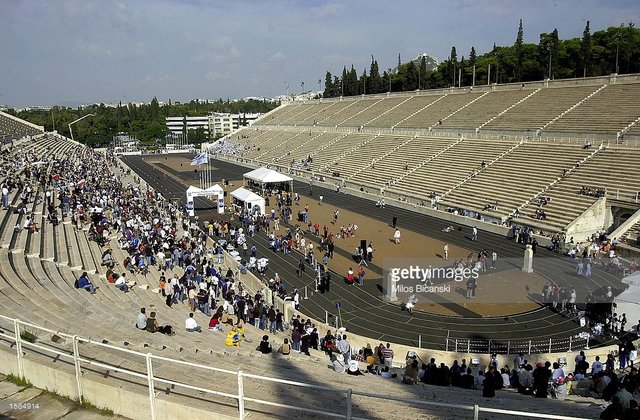The Athens Marathon - By @georgelj2809

The Steem article City Run - Showcasing Johannesburg yesterday by @spartanza, who ran his first road race, the Johannesburg 10k, brought back very fond memories of the historical marathon I ran in Greece. It was the iconic Greek Athens Marathon run from the small town of Marathon to Athens. A distance of 42.2 kilometres.
Sadly, we did not have digital cameras and smart phones of today to record the event. I recall running through small Greek villages with the crowds encouraging us on the way into Athens. I did not know it at the time, but I was in third position. I had my own Greek, white helmeted, feather-bedecked, motorcycle policeman astride his white Harley Davidson leading me through the streets of Athens to the finish in the historical Stadium. The stadium was not as pristine as this as in the photo below as it has since been upgraded. There is a 42 kilometre brass plaque at the entrance into the stadium which one reaches by running up a number of steps. The last 200 metres was around the track.
I felt like an Olympic star with onlookers cheering me on.

I know now I could have finished second had I known that a Cape Town architect was only a short distance ahead of me. I love running in the heat and I felt very strong at the finish. The Greek crowds were fantastic. The Athens traffic literally came to a standstill and anyone who has been to Athens knows that there is a huge roundabout similar to the one in Rome, which makes Piccadilly Circus look pedestrian. I recall my time was under three hours. I think that was the first time I had broken the three-hour barrier which most new, amateur runners aspire to achieve. It shows what motivation and the support of a crowd can do, even for a relative mediocre runner like me.
DEMOCRACY
I was already an activist in those days and a change maker. This was during the period of United Nations’ sanctions banning countries from having any sort of contact with South Africa. This included sport. South Africans were banned from running the Athens Marathon but that did not stop a large contingent of runners from South Africa organizing a tour and running the same course a week later. We did not let politicians stand in the way of our freedom.
We runners organised a tour which took us on a tour of all the Greek historical sites which included running the Athens Marathon. This marathon starts in the small village of Marathon and finished in the original Olympic Stadium. The stadium is in the form of an elongated horseshoe. The start is also very emotional because each runner was given an olive branch which is thrown into the memorial to Pheidippides, the runner who ran from Marathon to Athens with the news that the Greek army had defeated the Persian army and then fell down dead. It must be borne in mind that he had taken part in the battle beforehand.
Not many know that Democracy was born in Greece. Many Greeks died on the battlefield protecting their freedom. So I have included a bit of that history taken from a Greek web site. Please watch the two videos below. It makes one wonder how little we know about those who died for the freedom we enjoy today.
History of the Greek Marathon
This is why the Athens Marathon is on so many runners’ bucket lists.
Many historians and philosophers consider the Battle of Marathon in 490 B.C. one of the most significant battles in human history; but the battle is perhaps now more famous as the inspiration for the modern marathon race. In order to understand the event’s importance to western culture, we need to go back to 508 B.C. Athens when the idea of democracy was in its infancy.
Back then, democracy (dēmokratía), was a revolutionary new concept that gave the individual certain freedoms, a voice in how the power of rule would apply – “rule of the people”. This concept sparked new ideas and inspiration in Greek society and culture, and gave the people freedom to create, to be rewarded, and to be recognized for their achievements. Systematic thought that included the disciplines of biology, geometry, philosophy, and physics emerged. The Greek people introduced the literary forms of epic and lyric poetry, theater, tragedy, and comedy. In their pursuit of order and proportion, the Greeks created an ideal of beauty and perfection.
At this point, democracy had not been tested or fully established. Then came the Battle of Marathon in 490 B.C. The battle was fought by free men with a new concept; freedom against suppression and slavery. John Stuart Mill, one of the most influential English-speaking philosophers of the 19th century, famously suggested that “the Battle of Marathon, even as an event in British history, is more important than the Battle of Hastings.” The Battle of Marathon is significant because it allowed democracy to develop and establish itself. If the battle had been lost, this new idea of democracy would have vanished and would not have been documented in history. There would not have been a second battle and another test at the battle of Thermopylae.
After the Athenian victory at the Battle of Marathon, Athens reached prosperous new heights. Democracy blossomed and became the foundation of western civilization. L. Siegfried, a German philosopher said it this way: “When Greeks were fighting at Marathon against the spiritually unconnected mass of Persians, they were fighting as people who had clear awareness of the right for a free political life. The consciousness of mankind . . . was born at Marathon.
We, the people of the West, must always kneel respectfully to the place where human dignity was established.” After the battle, legend has it that the Greek messenger Pheidippides ran from the battlefield at Marathon to Athens in order to relay news of the victory. He only said, “We were victorious!” and collapsed and died from exhaustion. The run became the inspiration for the Marathon event, introduced at the 1896 Modern Olympics.
The original epic run of Pheidippides continues to inspire runners today. Today, athletes who run the Athens Marathon on Nov. 9, 2014 will be running in the same footsteps as Pheidippides. But when they run the original historical course, they run not only in the footsteps of ancient Greek heroes and legends, they also run in the birthplace of democracy. You can learn more about the Battle of Marathon and the history of this epic race on Apostolos’s website at http://www.athensmarathon.com
Image Source: CBS NEWS and Getty Images
This blog was written by @georgelj2809, and posted by @spartanza. SteemDollars will be transferred to the author
The old stadium trips me out. Those turns are so tight a person would practically twist their ankle if they were running a 400m race! Cool experience!
I had the same thought. When I researching for the post, and saw images of the stadium, I thought it may not even be the stadium it was so so tight!